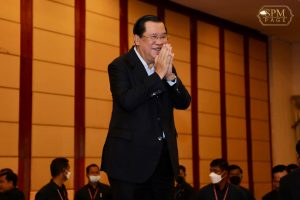One reason why Cambodian Prime Minister Hun Sen has survived in politics for nearly four decades is that he doesn’t see any threat as too small. A wayward social media post from a random activist must not go unpunished, pour encourager les autres. But he’s no tin-pot dictator who exists through aggression alone. There is something of the sacral to Hun Sen’s rule, something that harks back to centuries past. His is an iron will to rule but with punishment and forgiveness in equal cruelty.
He’s the father who you never know is going to beat you or ruffle your hair. Like a god-king of past centuries, you’re instructed to fear and love him in equal measure – or, perhaps more accurately, you’re instructed to love him because he hasn’t beaten you as much as he could have. When the father doesn’t give you stripes from a belt, even when he can, you’re compelled to bow down and praise his mercifulness, his benevolence. At that moment, you’re taught to adore your tormentor.
Take the recent case of Yim Sonorn. On March 22, the former opposition activist, along with another activist Hun Kosal, was remanded in custody by a Phnom Penh Municipal Court on charges of insulting King Norodom Sihamoni and “inciting serious social unrest.” They had posted a few innocuous comments on Facebook insinuating that Hun Sen, now in power for 38 years, has more authority than the monarch, hardly a rarified observation. And a leader who is planning his own dynastic succession, who has funded films and monuments to Cambodia’s historic “peasant king” Sdech Kan, and regularly speaks of himself as the “father” of the Cambodian people, it’s rather pitiful of Hun Sen to pretend he doesn’t see himself in a monarchical light.
The order had come down from Hun Sen for the pair’s arrest. Not waiting for the lickspittle courts to decide, Hun Sen also presumed to judge the verdict of their case, via an exchange with his supporters on Yim Sonorn’s Facebook page. “It would be weird if they are not guilty because [what they said] is not an expression of opinion, but it is a distortion of the truth with an intent,” he wrote. But on March 28, Yim Sinorn was released after posting a video from prison apologizing to the king and to Hun Sen. “I take this occasion to ask for forgiveness from the king and apologize to Samdech Hun Sen publicly with honesty,” he said. Hun Sen, naturally, didn’t keep his “benevolence” quiet.
For followers of Cambodian politics, this is not an uncommon situation. Someone is arrested for trumped-up charges on Hun Sen’s orders; that person or their family begs Hun Sen for clemency; Hun Sen intervenes to order their release; Hun Sen loudly applauds himself as a benevolent ruler. But a few things stand out, and it must be recalled that all this takes place amid the sweltering heat of dictatorship in Cambodia ahead of a general election in July. First of all, Yim Sinorn was arrested ostensibly because the authorities felt that he insulted the king. He was then released because Hun Sen felt his apology was sincere. Rather than justice, what Hun Sen wants is “re-education,” to punish and then redeem these sinners.
At the same time, Hun Sen got to ventriloquize for the monarchy on two fronts: he got to decide when it was insulted, and he got to decide when someone should have been forgiven for that apparent insult. More worryingly, Hun Sen explicitly said one reason he ordered Yim Sinorn’s release was that the activists’ wife, Sophat Makara, didn’t appeal for assistance from a foreign organization but from the prime minister. “I am a stubborn person under foreign pressure,” wrote the prime minister. “The more [foreign pressure], the longer the convict is imprisoned. This has to be remembered.”
But that puts ordinary Cambodians in a predicament. Those who want real political reform should not want Hun Sen’s mercy. If they’re innocent then let it be proved or let the justice system be shown to be the rot it is. Even if one disagrees with whether Yim Sinorn had actually committed a crime, a Phnom Penh Municipal Court felt it was worth arresting him for one. According to Hun Sen, after Sinorn apologized, the Minister of Justice was instructed to mediate with the court for his release.
But every time someone petitions Hun Sen for clemency, and every time he grants it (and then celebrates his own benevolence), it cuts one more chuck out of any semblance of rule of law. Of course, the family of the individual who’s arrested only wants that family member to be freed; the ethics are beyond the point. And, naturally, the times when people don’t appeal to Hun Sen for clemency won’t make the headlines. There are numerous political prisoners who have refused to play Hun Sen’s game and are courageously trying to survive in prison. It’s rather impressive that Kem Sokha, the opposition leader sentenced to 27 years of house detention this month, has refused to plead for a pardon, although it’s not clear if one has been tactically offered. Instead, his lawyers say they’ll appeal through the courts.

































